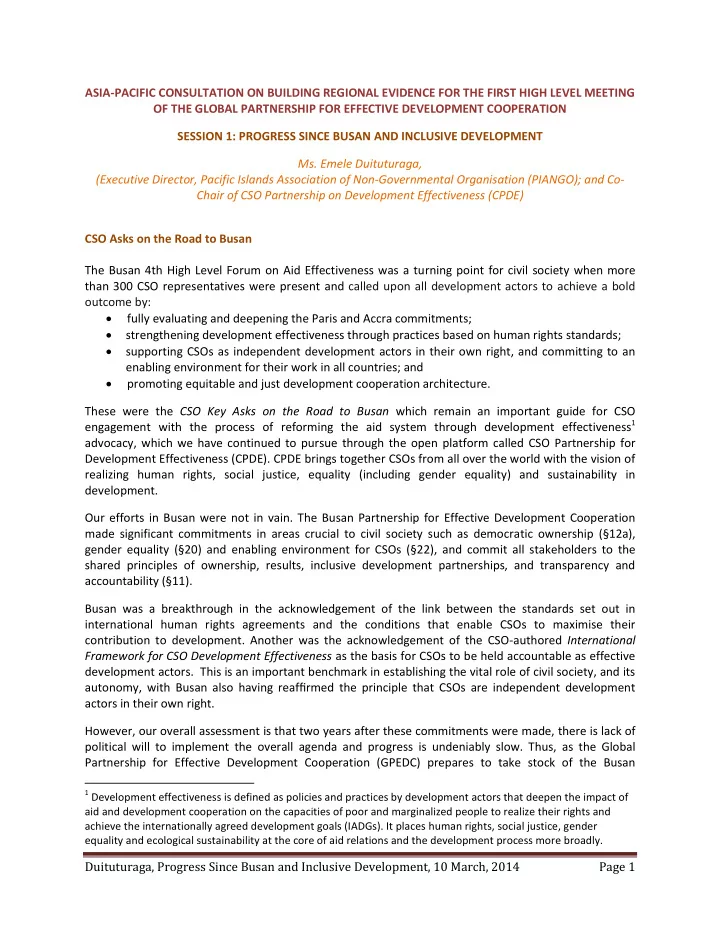

ASIA-PACIFIC CONSULTATION ON BUILDING REGIONAL EVIDENCE FOR THE FIRST HIGH LEVEL MEETING OF THE GLOBAL PARTNERSHIP FOR EFFECTIVE DEVELOPMENT COOPERATION SESSION 1: PROGRESS SINCE BUSAN AND INCLUSIVE DEVELOPMENT Ms. Emele Duituturaga, (Executive Director, Pacific Islands Association of Non-Governmental Organisation (PIANGO); and Co- Chair of CSO Partnership on Development Effectiveness (CPDE) CSO Asks on the Road to Busan The Busan 4th High Level Forum on Aid Effectiveness was a turning point for civil society when more than 300 CSO representatives were present and called upon all development actors to achieve a bold outcome by: fully evaluating and deepening the Paris and Accra commitments; strengthening development effectiveness through practices based on human rights standards; supporting CSOs as independent development actors in their own right, and committing to an enabling environment for their work in all countries; and promoting equitable and just development cooperation architecture. These were the CSO Key Asks on the Road to Busan which remain an important guide for CSO engagement with the process of reforming the aid system through development effectiveness 1 advocacy, which we have continued to pursue through the open platform called CSO Partnership for Development Effectiveness (CPDE). CPDE brings together CSOs from all over the world with the vision of realizing human rights, social justice, equality (including gender equality) and sustainability in development. Our efforts in Busan were not in vain. The Busan Partnership for Effective Development Cooperation made significant commitments in areas crucial to civil society such as democratic ownership (§12a), gender equality (§20) and enabling environment for CSOs (§22), and commit all stakeholders to the shared principles of ownership, results, inclusive development partnerships, and transparency and accountability (§11). Busan was a breakthrough in the acknowledgement of the link between the standards set out in international human rights agreements and the conditions that enable CSOs to maximise their contribution to development. Another was the acknowledgement of the CSO-authored International Framework for CSO Development Effectiveness as the basis for CSOs to be held accountable as effective development actors. This is an important benchmark in establishing the vital role of civil society, and its autonomy, with Busan also having reaffirmed the principle that CSOs are independent development actors in their own right. However, our overall assessment is that two years after these commitments were made, there is lack of political will to implement the overall agenda and progress is undeniably slow. Thus, as the Global Partnership for Effective Development Cooperation (GPEDC) prepares to take stock of the Busan 1 Development effectiveness is defined as policies and practices by development actors that deepen the impact of aid and development cooperation on the capacities of poor and marginalized people to realize their rights and achieve the internationally agreed development goals (IADGs). It places human rights, social justice, gender equality and ecological sustainability at the core of aid relations and the development process more broadly. Duituturaga, Progress Since Busan and Inclusive Development, 10 March, 2014 Page 1
commitments in its first High-Level Meeting to be held in Mexico City in April 2014, CSOs are calling on all development actors to ensure an urgent and meaningful implementation of existing pledges towards development effectiveness. So what how does the evidence stack up on progress since Busan? For this presentation, I have drawn on a number of sources: (1) CPDE Synthesis of evidence of progress since Busan on an enabling environment for civil society organisations. A CPDE contribution to the Global Partnership for effective development cooperation monitoring framework : Indicator 2 (October, 2018) (2) Review of evidence of progress of civil society related commitments of the Busan High level Forum by the Task Team on Development Effectiveness and Enabling Environment (December, 2013) (3) 2013 State of Civil society report, by CIVICUS (4) The Report of the Special Rapporteur on the rights to freedom of peaceful assembly and of association to the Un Human Rights Council, (May 2013) (5) Asia Pacific CPDE Mapping of Aid and Development effectiveness in the Pacific (November, 2013) Strengthen the enabling environment for CSOs as independent development actors In Busan, governments agreed to ”enable CSOs to exercise their role as independent development actors, with a particular focus on enabling environment, consistent with agreed international rights (§22a, emphasis added) ”. Yet, country case studies and other documentation, from both CSOs and other independent observers cited in the CPDE’s review of evidence, confirm the Special Rapporteur’s observation of a persistent and continuing narrowing of the legal and regulatory space for civil society. In September 2013, the Special Rapporteur spoke at a high level event on supporting civil society, convened by President Obama in New York, where he noted, “civil society and those facing dissent face s ome of the most significant challenges, unlike those who support official policies…Repressive legislation, often shared between states, is becoming a threat to civil society as Member states make laws criminalising or restricting this work…Restrictions on funding have become a major existential threat to associations across the world 2 . The CIVICUS Report points to 413 threats to civil society in 87 countries between January2012 and October 2013. On a more positive note, some governments are making efforts to improve conditions for CSOs as evidenced at the UN Human Rights Council’s 25 th session in 2014 when several governments enabled the passing of a resolution urging a panel discussion on the creation of a safe and enabling environment for civil society in law and practice. The Busan commitment to create an enabling environment for CSOs clearly requires an accountability framework and close monitoring of these commitments to minimum standards for enabling conditions for CSOs. To this end, we need to step efforts in reporting on Indicator 2. 2 Maina Kiai, “observations on communications transmitted to Governments and replies received (A/HRC/23/29Add.2), May30,2012, accessible at http://www.ohchr.org/Documents/Issues/FAassociation/A-HR- 23--Add2_EFS.pdf Duituturaga, Progress Since Busan and Inclusive Development, 10 March, 2014 Page 2
Recommend
More recommend